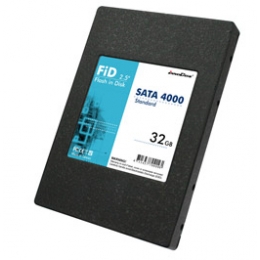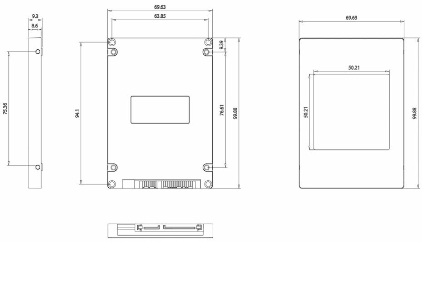| Introduction of InnoDisk FiD 2.5 SATA4000 |
InnoDisk FiD 2.5 SATA4000 products provide high capacity flash memory Solid
State Drive (SSD) that
electrically complies with Serial ATA (SATA) standard. InnoDisk FiD 2.5 SATA4000 support SATA I
standard
(1.5Hz) with high performance. Sustain read is 37MB(Max) per second, and sustain
write is
34MB(Max) per
second. InnoDisk FiD 2.5 SATA4000 uses standard 2.5-inch form factor, which can
be
used in laptop.
InnoDisk FiD 2.5 SATA4000 is also designed for industrial field. The SSD have
good
performance, and have
small latency time. It effectively reduces the booting time of operation system
and
the power consumption is
less than hard disk drive (HDD). InnoDisk FiD 2.5 SATA4000 can work in
harsh
environment. The SSD is
vibration resistance, and can work in lower or higher temperature than HDD.
InnoDisk FiD 2.5 SATA4000
complies with ATA protocol, no additional drives are required, and the SSD
can
be configured as a boot device
or data storage device.
The SATA I bridge controller is 1.5 Gbps (Gen. 1), and support hot-plug. The
main function is to bridge
between a legacy IDE storage device and a Serial ATA host. The Serial ATA
physical, link and transport layers
are compliant with Serial ATA Gen 1 specification (Gen 1 supports 1.5Gbps data
rate). The data burst rate
between SATA I bridge controller and ATA controller is 100MB/sec.
The ATA controller is equipped with 12KB of internal memory that is used for
storing data. The internal memory
can also be used as an intermediate memory for storing data blocks during a
wear-leveling procedure. There
are 40KB of internal memory is used for code. A 10KB internal boot ROM includes
basic routines for accessing
the flash memories and for loading the main code into the internal memory.
| Error Detection and Correction |
Highly sophisticated Error Correction Code algorithms are implemented. The ECC
unit consists of the Parity
Unit (parity-byte generation) and the Syndrome Unit (syndrome-byte computation).
This unit implements an
algorithm that can correct four bits per 512 bytes in an ECC block. Code-byte
generation during write
operations, as well as error detection during read operation, is implemented on
the fly without any speed
penalties.
Flash memory can be erased within a limited number of times. This number is
called the erase cycle limit or
write endurance limit and is defined by the flash array vendor. The erase cycle
limit applies to each individual
erase block in the flash device.
InnoDisk FiD 2.5 SATA4000 uses a wear-leveling algorithm to ensure that
consecutive writes of a specific
sector are not written physically to the same page/block in the flash. This
spreads flash media usage evenly
across all pages, thereby extending flash lifetime.
Bad Blocks are blocks that contain one or more invalid bits whose reliability
are not guaranteed. The Bad
Blocks may be presented while the SSD is shipped, or may develop during the life
time of the SSD. The Bad
Blocks will not exceed more than 3% of the total device volume. When the Bad
Blocks is detected, it will be
flagged, and not be used anymore. The SSD implement Bad Blocks management, Bad
Blocks replacement,
Error Correct Code to avoid data error occurred. The functions will be enabled
automatically to transfer data
from Bad Blocks to spare blocks, and correct error bit.
|

 Industrial Temperature -10 +70
Industrial Temperature -10 +70 Wide Temp -40 +85
Wide Temp -40 +85